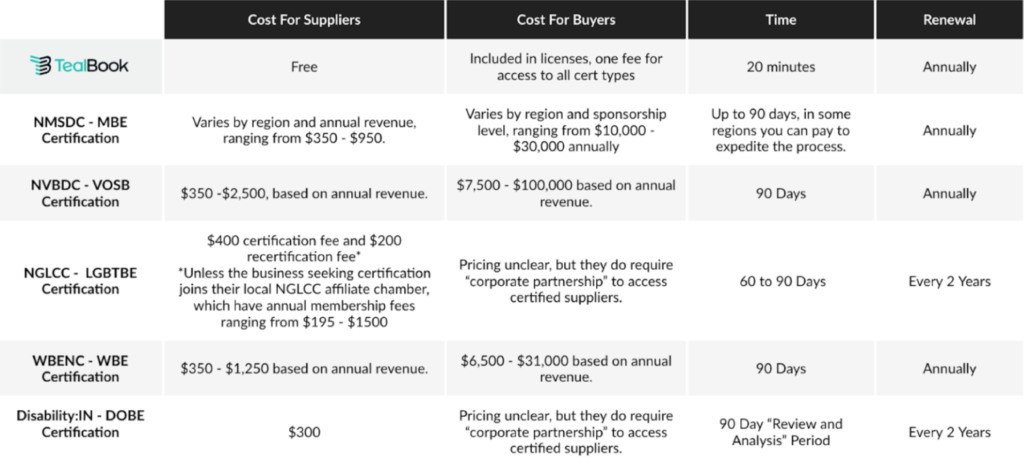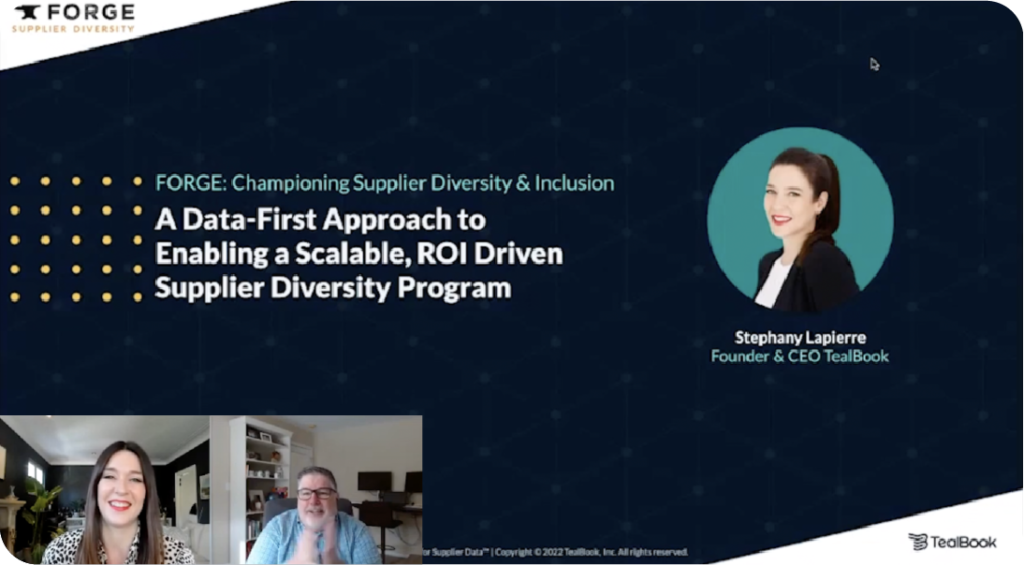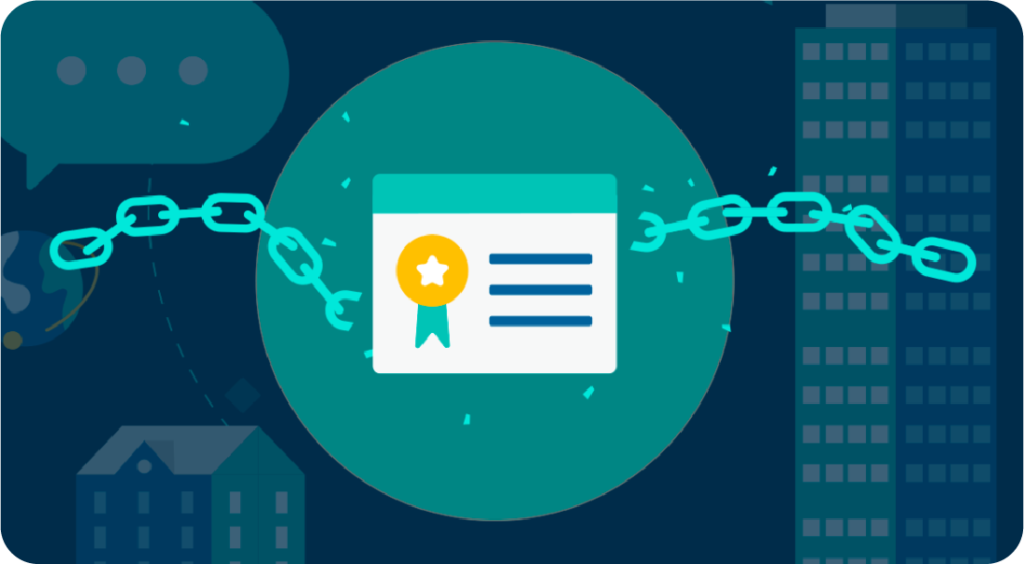The Billion Dollar Roundtable has set the standard for organizations to find and work with diverse suppliers. While well-intentioned, the program architecture favors heavy-weight buyers in the sourcing process, leaving many small and diverse suppliers at a disadvantage when vying for new business.
In this post, we examine the issues of the BDR, provide insight on how current certification requirements can hurt diverse suppliers, and present real solutions that encourage a more equitable process while making a positive impact on buyers and suppliers alike.
Navigating change in procurement is never easy. This resource will give you a better understanding of why the status quo is impeding progress and how you can challenge the traditional modalities of supplier certification for more inclusive, equitable sourcing.
Broken down by section below, you can browse certification challenges and how to address them.
- The problem with rigorous certification processes:
- The financial side
- The social side
- Addressing these problems for a more equitable supply chain:
- Third-party certifications
- Self-certifications
- The TealBook self-certifying process
- Visibility into Tier 2 diversity
- The bottom line

The inception of the Billion Dollar Roundtable was a turning point in procurement. It established a vision for supplier diversity excellence and gave companies an incentive and a roadmap for prioritizing spend with minority-owned businesses. The importance of this cannot be overstated, as the standard set by members of the BDR has made an enormous impact on the state of corporate DEI.
Currently standing 28 member companies strong, the BDR has spent over two decades shaping best practices in supplier diversity, including setting the parameters for what it means to be a diverse supplier. They do this by endorsing specific certifying organizations. There are a limited number of certifications the BDR considers to be valid, and the diverse spend of their members is audited to ensure that all of their diverse suppliers meet the certification standards set by these certifying bodies.
While being stringent about certificate validity is important for the integrity of a diversity program, a problem arises when the only valid certifications are difficult to obtain. Nearly all of the certificates that a supplier is required to have in order for their business to count as diverse require an application fee, re-application fees upon annual or biannual expiry, a lengthy waiting period, and an intensive validation process. These factors create a barrier to entry for MBEs and WBEs, ironically working against the purpose of inclusivity.
Less costly and time-consuming alternatives–referred to as “third-party certificates”– are often more accessible for MBEs and WBEs and have tremendous potential to create opportunities for disadvantaged businesses. However, companies with the myopic goal of making it into the ranks of the BDR will miss out on the potential competitive advantages of working with suppliers who only hold third-party certificates.
By making room for these suppliers and widening the criteria for diverse suppliers to include them, companies will find increased advantages and truly make good on their commitment to supplier diversity.
The problem with rigorous certification processes
There are several issues associated with the rules and regulations surrounding the certification of small and diverse businesses via the powers of the Billion Dollar Roundtable.
The financial side
Small and diverse business owners have to spend a lot of money in order to become certified within the BDR. For starters, there are fees associated with the application process—a process that also requires a great deal of personal documentation. Not only do these suppliers have to pay upfront, but they also lose time away from their business operations as they gather and file that required paperwork, costing them additional money in lost productivity.
Fees differ depending on the agency providing the certification. In some cases, such as with the Inclusive Workspace and Supply Chain Council of Canada, it can cost $800 just for the initial certification, with a yearly $500 fee to remain certified. The Accion Opportunity Fund claims earning a Minority Business Enterprise (MBE) certification can “cost from several hundred to over a thousand dollars.” Small and diverse businesses cannot always swing this, leaving them out of the running to work with larger buyers.
Those certification fees also vary depending on the size and location of the business—so as a supplier grows and their annual revenue goes up, they can be required to pay higher annual fees for certification. Since that business needs to re-certify each year in order to remain eligible for contracts within the BDR, it’s almost as if they are being punished for being successful year-over-year.
Accessing Certificates by Certifying Authority

Now, all the fees and the effort put in to earn diversity certifications would likely be worth it if these diverse suppliers were guaranteed to gain more business upon becoming certified. However, that’s not always the result. Suppliers are often sold on the idea that becoming certified within the BDR will give them more opportunities for business, but, in some cases, this is an empty promise that comes off as performative within a “pay-to-play” space.
Lastly, there is the lack of intersectionality to consider. Minority suppliers are required to apply for individual certifications and pay for each one. For example, a business that technically qualifies as black-owned and gay-owned would be required to pay two separate fees and gather two separate sets of paperwork in order to earn those certifications. When minority businesses already have fewer financial advantages, having them go through this process twice and pay multiple fees is far from ideal.
The social side
Beyond the financial issues associated with official certification within the BDR, there are several problems with having minority owners prove they are, in fact, minorities.
For starters, certification processes can often include an on-site visit from a surveyor to prove the business actually qualifies for the certification they are applying for. While this can make sense from a business perspective, consider how this can make a minority business owner feel.
They may have been marginalized due to their minority status their entire lives, and, right when they are growing a business and working to achieve greater success, they must prove to a third-party surveyor that they are actually a minority and worthy of a piece of paper that says so.
This certification process may also discount the experience of disabled business owners. While surveyors may come prepared with a checklist of disabilities, that does not always account for the financial and psychological difficulties that come with maintaining a physical or mental health diagnosis within many healthcare systems.
At the end of the day, these processes can be irritating at best, humiliating at worst, and ultimately discourage small and diverse business owners from seeking certifications.
Addressing these problems for a more equitable supply chain
If the goal of diversity programs is to uplift diverse businesses, there needs to be an emphasis on ease within the certification process. The last thing diverse business owners need is to spend additional time and money—that they may not be able to spare—jumping through hoops to obtain and maintain certifications in the hopes of more business opportunities.
How are we, as procurement organizations, able to improve and simplify the process for these suppliers? We change the way they earn certifications.
Third-party certifications
Outside of the certifying agencies within the Billion Dollar Roundtable are third-party agencies, like those of federal and state governments. These agencies often do not have such a rigorous process that suppliers must go through and are a good alternative to earning minority business certifications.
Self-certifications
At TealBook, we believe a quick and free self-certification process is the most equitable solution to the certification challenge. Self-certification shifts the burden of obtaining a diversity certification from the supplier to the buyer. It also allows the buyer to decide if suppliers meet their qualifications, or, if they don’t, take on the responsibility of supporting a self-certified supplier in gaining official certification.
This allows for a much more equitable process and larger impact than would not be had if buyers just sifted through a list of suppliers who were lucky enough to have the time and resources needed to obtain an official certification on their own.
While working with customer groups at TealBook, supplier diversity program leader, Lisa Westgate, learned firsthand that, “having the tools needed to find these suppliers with ease, even those without official certifications, can help unlock opportunities that positively impact both organizations.” In a recent blog, she outlines the certification challenges procurement teams face and how to incorporate more equitable sourcing practices, including championing the self-certification process outlined below.
The TealBook self-certifying process
TealBook allows suppliers who meet sustainability, diversity, or small business requirements to self-certify via a 5-step process within its supplier data platform, providing a free alternative to daunting and expensive certification programs. On average, it takes roughly 24 minutes, and the way the self-certification is structured ensures that suppliers meet the requirements for certification audits.
Once they are on the platform, suppliers can be found by buyers looking to work with specific types of diverse businesses, without the cost or effort needed to apply for the official certification, increasing visibility for buyers performing more granular searches.
A supplier can also upload third-party certifications to the TealBook platform. In some cases, buyers may identify a supplier on the database, see that it is self-certified, and offer to cover the cost of the official certification because they want to work with that supplier. Buyers search the platform using artificial intelligence software to find ideal matches based on their criteria – which is far more time-efficient for both parties than attending conferences and networking events.
Inclusion on the TealBook platform is therefore not a disincentive to seek third-party certification later, when the time is right. In some cases, that could even lead to opportunities within the Billion Dollar Roundtable.
TealBook’s supplier database currently includes more than a half-million small and diverse supplier profiles and allows buyers to find the right suppliers to meet their organization’s diversity goals, with diverse suppliers listed under the following categories:
- Minority Business Enterprise
- Women-Owned Business
- Small Business Enterprise
- Veteran Business Enterprise
- Disabled Veteran Business Enterprise
- Service Disabled Veteran Business Enterprise
- LGBT Business Enterprise
- Certified Aboriginal Business
- HUB Zone Certified
- People with Disability
- Disadvantaged Business Enterprise
- Women-Led Business Enterprise
Visibility into Tier 2 diversity
Moreover, TealBook’s approach provides visibility into diverse spend beyond Tier 1. TealBook encourages listed suppliers (all, not just diverse suppliers) to upload details of their own spend.
Companies looking to receive Tier 2 spend reporting can also invite their Tier 1 suppliers to participate. Any invited supplier in the supply chain can securely upload spend either quarterly or annually. This spend information is kept private to them until they explicitly release it.
Organizations can then choose to allocate diversity spend to their client companies, either by percentage or by amount per supplier. TealBook combines this allocated spend information from all contributing suppliers into a consolidated Tier 2 Diversity Spend report.
Exploring Tier 2 diverse spend expands the scope of a supplier diversity program. For companies that have not yet explored reporting on their diversity spend, Tier 2 can be a great place to start. By recognizing the diverse spend of the suppliers they already do business with, firms can better evaluate where to focus their diversity goals.

The bottom line
The Billion Dollar Roundtable was founded to improve diversity, equity, and inclusion initiatives within businesses. Unfortunately, over time, it has become a pay-to-play space where the focus has shifted more to boosting corporate reputation and meeting numbers on a spreadsheet rather than providing tangible opportunities for minority business owners.
In order to make a real impact, there needs to be a change in where the burden of certification lies. After all, buyers benefit from achieving the maximum certifying diverse spend, and supporting a self-certified supplier through the process of getting BDR-certified creates actional impact for all those involved and assists in creating real equity for underserved businesses.
Learn more about the self-certification process with TealBook’s supplier data platform by visiting our website or reaching out to a member of our team.
Additional resources to level up your supplier diversity expertise:




